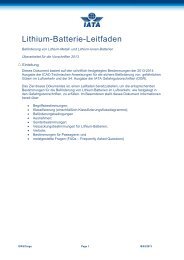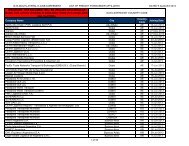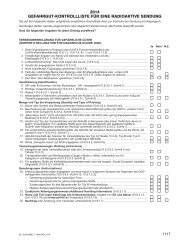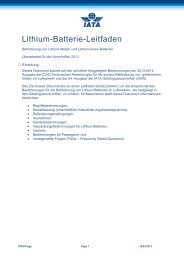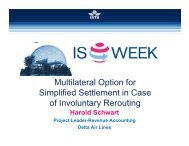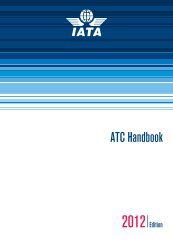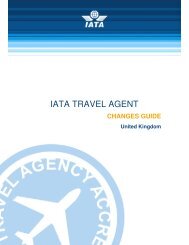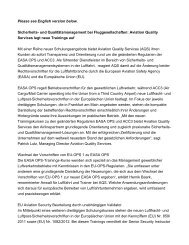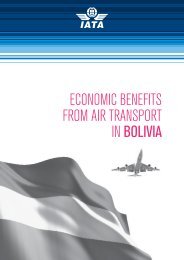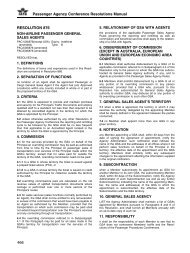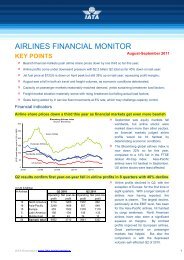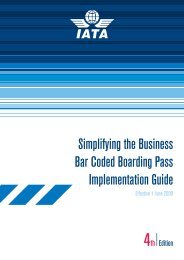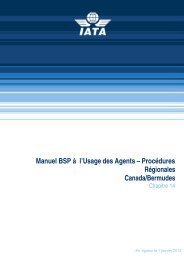Economic Regulation - IATA
Economic Regulation - IATA
Economic Regulation - IATA
Create successful ePaper yourself
Turn your PDF publications into a flip-book with our unique Google optimized e-Paper software.
01 - <strong>Economic</strong> <strong>Regulation</strong> 13<br />
However, the rate-of-return mechanisms and restrictive<br />
lease contracts contain few incentives for an airport to<br />
improve efficiency or to increase revenues from nonaeronautical<br />
sources, with cost risk largely passed on<br />
to airlines and their users. It has also been associated<br />
in some cases with excessive investment bearing little<br />
relation to potential commercial returns.<br />
Latin America.<br />
Many Latin American airports have been privatised<br />
without proper independent economic regulation. In most<br />
cases governments actually benefit from the privatisation<br />
by extremely high concession fees required from the<br />
concessionaire.<br />
One exception is Mexico where most privatised airports<br />
have a Federal economic regulation that only allows their<br />
charges to rise with inflation minus an efficiency factor<br />
(similar to the UK system). The major flaw in that system<br />
however is there is no requirement for airports to consult<br />
their customers on the level of investment for airports.<br />
Airports are allowed to recover their investment costs<br />
with high rates of return through the regulated charges<br />
eventually leading to excessive pricing.<br />
In Summary<br />
Independent economic regulation is an important tool in<br />
improving the efficiency of operations and investment<br />
within the aviation industry. It is required for all cases<br />
where competition is not sufficient to restrain the market<br />
power of an airport or ANSP.<br />
<strong>IATA</strong>’s preference is, where regulation is needed, it<br />
should involve detailed cost-efficiency targets and<br />
service quality standards. It should preferably be based<br />
on price-cap regulation with single-till procedures. Such<br />
a system has been successful in improving efficiency<br />
where implemented and can be expanded and improved<br />
to meet changing investment needs.<br />
Nevertheless, even where an alternative regulatory<br />
framework is chosen it must meet certain key principles<br />
– including independence, appropriateness, transparency<br />
and consultation – if it is to be effective in improving the<br />
aviation industry for the benefit of all stakeholders.<br />
No regulation.<br />
In addition to these examples, there are several cases<br />
where the lack of independent economic regulation<br />
has led to excessive and unjustified user charges.<br />
For example, in advance of its privatisation, the French<br />
government allowed Aeroports de Paris to increase its<br />
charges by 5% in real terms for five years without any<br />
justification or transparency for the decision.<br />
In Argentina, a failed concession leaves airlines with<br />
unacceptable charges levels and full freedom for<br />
the airport to raise more revenue through additional<br />
charges. Instead of independent economic regulation the<br />
government became a business partner with the airport<br />
at the expense of airlines and passengers.<br />
In Germany, the government’s proposals for privatising<br />
its ANSP, DFS, include plans to increase charges by<br />
11%-12% and allow a return on capital of 9.4%, far<br />
too high for a low-risk, monopoly provider.<br />
Examples like these highlight the need for an independent<br />
regulatory structure that takes into account the interests<br />
of customers, protecting them against artificial and<br />
unjustified increases in charges, including where these<br />
are used to boost the value of an airport or ANSP prior<br />
to privatisation.



